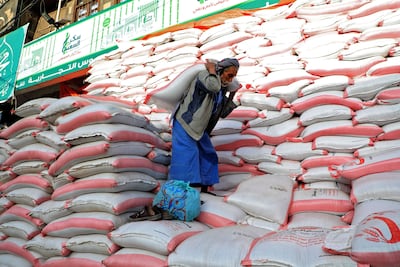Yemen, Egypt and Lebanon are among countries facing “a catastrophe on top of a catastrophe” after Russia's invasion of Ukraine, the UN food agency chief said.
David Beasley, executive director of the World Food Programme, told the UN Security Council people would go hungry if the world did not increase levels of humanitarian aid, because the programme's expenses were soaring.
Many Middle East countries rely on Ukraine for much of their wheat imports.
Mr Beasley said the global impact of the war would be “beyond anything we’ve seen since World War Two” because many of the Ukrainian farmers who produce a significant amount of the world’s wheat are now fighting Russians.
His agency was feeding 125 million people before Russia’s invasion of Ukraine on February 24.
Mr Beasley said it has had to start cutting their rations because of rising food, fuel and shipping costs.
He said that in Yemen, where the food allotment to eight million people was cut by 50 per cent, “now we’re looking at going to zero rations”.
The war in Ukraine is turning “the breadbasket of the world to breadlines” for millions of its people, while devastating countries such as Egypt, that normally buys 85 per cent of its grain from Ukraine, and Lebanon where 81 per cent of supplies in 2020 came from Ukraine, he said.
Ukraine and Russia produce 30 per cent of the world’s wheat supply, 20 per cent of its corn and 75 to 80 per cent of the sunflower seed oil. The World Food Programme buys 50 per cent of its grain from Ukraine, he said.

The war is to increase the agency’s monthly expenses by $71m because of rising food, fuel and shipping costs, he said.
That will total $850m for a year and mean that there will be “four million less people we’ll be able to reach".
Mr Beasley said the World Food Programme is reaching about a million people inside Ukraine with food now. He said he hoped that would reach 2.5 million over the next four weeks, four million by the end of May and six million by the end of June.
The cost is about $500m for the first three months and “we are short by about $300m, so we’re going to need to step up,” he said.
He said that focusing on Ukraine should not lead the international community to neglect Africa, especially the Sahel, and the Middle East, because “otherwise, you’ll have massive migration” to all parts of Europe.
“If we end the conflict, address the needs, we can avoid famine, destabilisation of nations and mass migration,” he said. “But if we don’t, the world will pay a mighty price and the last thing we want to do as the World Food Programme is taking food from hungry children to give to starving children.”






